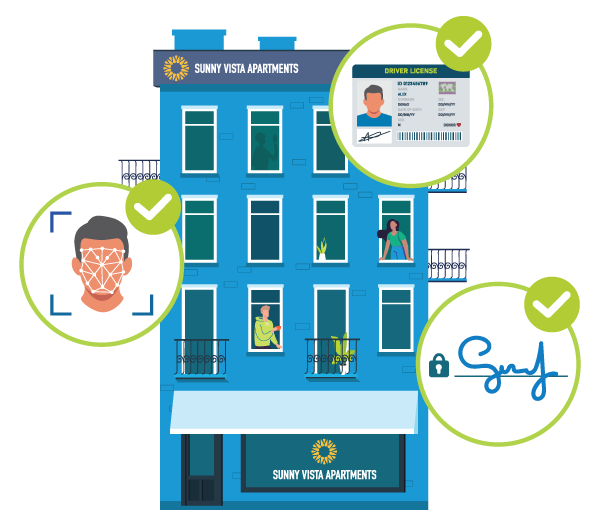Rental Fraud: Risks, Prevention, and Protection Tips
The rental housing market has undergone a rapid digital transformation in recent years. Listings are now shared almost exclusively online, applications are processed remotely, and renters can sign leases or transfer deposits without ever stepping into a leasing office. While this shift has streamlined the rental process, it has also opened the door to a growing threat: rental fraud.
From fake listings that trick renters into paying deposits for non-existent properties to fraudulent resident applications that saddle landlords with costly evictions, scams are becoming more sophisticated and harder to spot. According to industry research, property managers are reporting record levels of suspicious applications and fraudulent activity across their portfolios.
This guide explores what rental fraud is, the common types of scams that affect both renters and landlords, the consequences of falling victim, and—most importantly—how technology and platforms like MRI Software help safeguard the leasing process.
What Is Rental Fraud?
Rental fraud encompasses any deceptive practice designed to exploit the leasing process for financial gain. For renters, this often takes the form of fake property listings or deposit scams. For owners and property managers, it can mean dealing with fraudulent applications, identity theft, or payment fraud from prospective renters.
In every case, the objective is the same: to trick an individual or business into parting with money or sensitive information under false pretenses.
Why Rental Fraud Is Growing
The rise of online listings, remote leasing, and digital payments has made it easier for fraudsters to operate anonymously. Scammers can quickly set up fake websites, post listings on legitimate platforms, and communicate with prospective residents via email or text—all without ever showing their face.
At the same time, property managers now process thousands of applications digitally, increasing the risk of false documents slipping through. Without reliable screening and verification tools, fraudsters exploit the speed and convenience of modern leasing systems.
Types of Rental Fraud
Rental fraud is a serious and growing challenge for the real estate industry, and affects renters and property owners alike.
From a Renter’s Perspective
Renters are frequent targets because they often feel pressure to secure housing quickly. Common scams include:
- Fake listings: Scammers post real properties they don’t own, using stolen photos to lure unsuspecting renters into paying deposits.
- Phantom rentals: Entirely fictitious properties advertised at attractive prices to capture payments from desperate renters.
- Identity theft: Fraudsters pose as landlords or property managers to collect sensitive personal data, including Social Security numbers and bank account details.
- Deposit scams: Renters are asked to pay upfront fees before touring the property, only to find the listing was fake.
From an Owner or Property Manager’s Perspective
Fraud also flows in the other direction, with applicants targeting landlords and property managers. Examples include:
- Fraudulent applications: Renters present forged pay stubs, employment records, or bank statements to meet screening requirements.
- Payment fraud: Fraudsters may use stolen credit cards, issue checks that bounce, or initiate chargebacks after moving in.
- Identity theft: Some applicants use stolen identities to pass background checks, making recovery of lost rent or damages even more difficult.
Our blog on renter fraud explores these risks in detail and offers strategies for property managers to mitigate exposure.
Rental Fraud From a Renter’s Perspective
Rental fraud puts renters at risk of risk losing money, personal information, and housing opportunities. Here’s how to spot the most obvious signs of rental fraud:
Red Flags in Rental Listings
There are several telltale signs that a rental listing may be fraudulent. Prices that seem too good to be true often are. Listings riddled with poor grammar, vague descriptions, or mismatched photos can signal a scam. Another common tactic is applying pressure to act quickly, such as claiming “other renters are interested” or demanding a deposit before you can tour the property.
Perhaps the clearest warning sign is a refusal to provide an in-person or virtual tour. Legitimate landlords and property managers will always allow you to verify the property before committing financially.
How to Verify Property Legitimacy
Renters can protect themselves by taking a few proactive steps. Cross-checking a listing across multiple platforms helps confirm whether the property is truly available. County property records are another valuable tool, allowing renters to confirm ownership details. When in doubt, contact the property management company directly to ensure the listing is real and active.
Steps to Avoid Common Scams
Above all, never pay in cash or via wire transfer. These methods are untraceable and cannot be reversed if the recipient is a scammer. Meet the landlord or agent in person whenever possible, or at least request a video walkthrough of the property. Use secure payment platforms and thoroughly research the property and surrounding neighborhood before signing or sending money.
For additional guidance, MRI has published resources on protecting yourself when navigating the rental process.
Rental Fraud From an Owner or Property Manager’s Perspective
Owners and property managers face revenue losses, legal battles, and reputational harm. Here are some of the ways rental fraud can affect property managers:
Fake Resident Applications with Forged Income or Employment Records
Applicants may submit fabricated documents to appear financially stable. With access to digital templates, scammers can create professional-looking pay stubs, employment letters, or bank statements that appear legitimate but don’t hold up under closer inspection. Without thorough verification, property managers risk approving renters who can’t actually afford the lease. Using automated income verification can help reduce this risk.
Identity Theft by Prospective Residents
Fraudsters sometimes use stolen identities to pass background checks. On the surface, everything may look legitimate, with credible-looking credit history, employment, and references, but the real person is unaware their details have been stolen. This not only jeopardizes the landlord’s rental income but also creates legal and reputational risks. Verifying IDs digitally helps flag these cases before leases are signed.
Rent Payment Scams
Even after a renter moves in, scams can continue. Common tactics include submitting checks that bounce, using stolen credit cards, or initiating chargebacks after the first rent payment. These scenarios create immediate cash flow problems for landlords and can result in costly legal proceedings to resolve.
The Consequences of Rental Fraud
For Renters
The consequences of rental fraud can be devastating. Victims often lose thousands of pounds or dollars in deposits, application fees, or rent payments for properties that don’t exist. Identity theft can lead to long-term credit damage and years of financial headaches. Beyond the financial loss, missing out on housing opportunities creates significant stress—particularly for families under time pressure to move.
For Owners and Property Managers
For landlords and property managers, rental fraud leads to revenue loss from unpaid rent, prolonged vacancies, or eviction costs. Legal fees and administrative burdens add further strain. Perhaps most damaging, repeated incidents can harm an organization’s reputation, making it harder to attract high-quality residents and retain owner trust.
Best Practices to Prevent Rental Fraud
Fortunately, awareness and preparation make all the difference in combatting rental fraud. By recognizing red flags, following best practices, and embracing advanced leasing technology, both sides of the rental process can dramatically reduce their risk exposure.
For Renters
- Verify ownership and property legitimacy before making any payments.
- Meet landlords or agents in person whenever possible.
- Avoid paying upfront fees without official documentation.
- Use secure payment platforms and remain cautious about sharing personal details.
For Owners and Property Managers
- Implement professional screening that checks credit, criminal history, and rental background.
- Use digital tools for verifying IDs and income.
- Require secure payment methods and monitor transactions for anomalies.
- Stay informed about industry risks—our blog on false positives highlights the balance between thorough screening and fair practices.
How Technology Helps Prevent Rental Fraud
The complexity and scale of modern leasing make manual fraud prevention unsustainable. That’s why property managers are turning to technology for protection.
Digital Identity Verification
Tools like CheckpointID scan government-issued IDs, cross-check them against databases, and even use biometric verification to confirm an applicant’s identity in real time. This significantly reduces the risk of accepting fraudulent applications.
Automated Resident Screening Tools
Platforms such as MRI’s resident screening system automatically check credit, criminal, and rental history during the application process. By reducing reliance on manual document review, property managers cut the risk of errors or being deceived by forged paperwork.
Payment Tracking and Fraud Alerts
Secure portals not only make rent collection easier but also include fraud detection features. Alerts can flag duplicate transactions, suspicious activity, or attempted chargebacks. For further reading, MRI’s insights on balancing fraud vs prevention explain why investing in robust systems pays dividends in reduced risk.
With MRI Software’s suite of tools, including automated income verification, digital verification, and fraud detection, property managers gain the confidence to operate securely in a digital-first rental market. By pairing vigilance with technology, the industry can protect its most valuable assets: trust, transparency, and resident satisfaction.
Property Management Software
Multi-discipline technology for property owners, investors and occupiers.

FAQs
Essential Strategies to Protect Your Multifamily Properties from Sophisticated Scams
Application fraud is escalating at an alarming rate, with sophisticated scammers using fake documents, stolen identities, and AI-generated information to slip past traditional screening methods. In this on-webinar, we exposed the most prevalent fraud…
